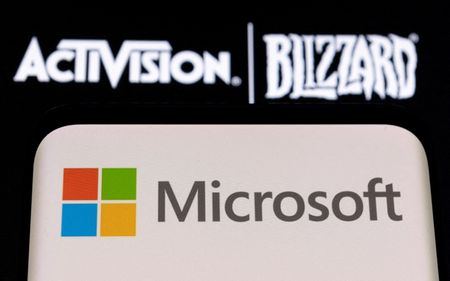BOJ stands pat, Activision acquisition deal, UAW strike – what’s moving markets
2023.09.22 05:06

Investing.com — The Bank of Japan maintained its extremely accommodative monetary policy stance, hitting the yen, while U.S. stocks are set for hefty weekly drops in the wake of the Federal Reserve’s hawkish tilt. Microsoft (NASDAQ:) could soon receive U.K. approval for its Activision purchase, while an expansion of the UAW draws nearer.
1. Futures edge higher, but on course for weekly drop
U.S. stock futures edged higher Friday, but are on course to post hefty weekly losses in the wake of the Federal Reserve signaling interest rates will stay higher for longer.
At 04:45 ET (08:45 GMT), the contract traded largely unchanged, climbed by 6 points or 0.1%, and inched up by 45 points or 0.3%.
The hawkish stance by the U.S. central bank resulted in bond yields surging, with the benchmark climbing to its highest level since 2007.
This has pressured the highly-indebted tech sector, with the on track to drop 3.5% this week, which would be its worst week since March.
The blue-chip Dow stands 1.6% lower so far this week, while the broad-based currently is on course to drop 2.7%.
The U.S. economic data slate will center around the purchasing managers index reports for September on Friday, with the expected to show a reading of 48, still in contraction territory, while the is tipped to come in at a healthy 50.6.
The equivalent data released earlier in Europe indicated that the eurozone economy will likely contract in the third quarter, with the flash coming in at 47.1 in September, a slight improvement from August’s 33-month low of 46.7.
2. BOJ maintains ultra-dovish stance, yen falls
The Bank of Japan maintained its short-term benchmark interest at negative levels earlier Friday, and said that it will continue with its current pace of asset purchases and yield curve control to stimulate the economy.
In a statement announcing the decision, the BOJ repeated a pledge to maintain ultra-loose monetary policy “as long as necessary to maintain the (2% inflation) target in a stable manner.”
While this had been widely expected, it followed recent comments from Governor Kazuo Ueda indicating that the central bank was considering a move away from this negative rate regime, following increases in wages and inflation.
Data released earlier Friday showed that the consumer price index came in above the BOJ’s 2% target for a 17th consecutive month, while a core reading that excludes fresh food and fuel prices hit an over 40-year high.
Japanese 10-year bond yields slid nearly 2% after the BOJ announcement, while the Japanese yen fell 0.5% against the U.S. dollar, trading close to a 10-month low at ¥148.30, at 04.45 ET (08.45 GMT).
This yen weakness prompted Japan’s Finance Minister Shunichi Suzuki to say he would not rule out any options, given the importance of trade on the Japanese economy.
“We are closely watching currencies with a high sense of urgency,” Suzuki said.
Japanese authorities intervened in the currency markets last September and October, buying the Japanese currency at levels around ¥145 and ¥150.
3. U.K. likely to approve Microsoft/Activision acquisition
Microsoft’s potential acquisition of Activision Blizzard (NASDAQ:) received a boost Friday, after Britain’s antitrust regulator said the restructured proposal, submitted in August, “opens the door to the deal being cleared.”
The $69 billion acquisition was blocked in April by Britain’s competition regulator, which was concerned Microsoft would dominate the growing cloud gaming market with the purchase.
The U.S. tech giant has since tried to allay these concerns, proposing the divestment of cloud rights for existing Activision games, including the popular “Call of Duty”, as well as new games over the next 15 years, to French game publisher Ubisoft Entertainment (EPA:).
The Ubisoft divestment “substantially addresses previous concerns,” the U.K.’s Competition and Markets Authority said in a statement.
4. Auto strike could be expanded
The strike affecting the Detroit Three automakers could be expanded later Friday unless new labor agreements can be agreed before the UAW union’s 12:00 ET (16:00 GMT) deadline.
The autoworker’s union last week launched simultaneous strikes at one assembly plant each of General Motors (NYSE:), Ford (NYSE:) and Chrysler parent Stellantis (NYSE:) in Missouri, Michigan and Ohio, which produce the Ford Bronco, Jeep Wrangler and Chevrolet Colorado, alongside other popular models.
UAW President Shawn Fain is due to speak two hours before the deadline, outlining the plants that will join the strike if a deal hasn’t been reached.
Analysts expect any wider strike will include plants that build highly profitable pickup trucks such as Ford’s F-150, GM’s Chevy Silverado and Stellantis’ Ram.
5. Oil rebounds after Russian export ban
Oil prices rose Friday on growing expectations of tighter supplies, but were on course for their first weekly loss in four weeks after the Fed’s warning on higher U.S. interest rates raised concerns of a hit to demand at the world’s largest consumer.
The news that Russia has banned exports of gasoline and diesel with immediate effect to stabilise the domestic fuel market has given the crude market a boost, as it forces Russia’s fuel buyers to shop elsewhere.
This added to an already tight supply situation as the Organization of the Petroleum Exporting Countries and allies maintained previously announced production cuts.
By 08:45 ET, the futures traded 0.7% higher at $90.28 a barrel, while the contract climbed 0.5% to $93.78.
Still, the benchmarks are on course to register small losses this week, potentially ending a run of three positive weeks which had pushed prices to 10-month highs earlier in September.








